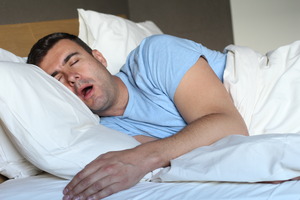
Do you frequently wake up in the morning only to find a small wet patch on your pillow? It could be a sign that you’re drooling in your sleep. This can be an embarrassing problem to be sure, but in some circumstances, it might also be worrying. Drooling can sometimes be a side effect of sleep apnea; is this true in your case? Here’s what you need to know if you have concerns about the quality of your sleep.
How Can Sleep Apnea Lead to Drooling?
As you may know, sleep apnea is a disorder that repeatedly interrupts your breathing while you’re asleep. The most common type of sleep apnea is obstructive sleep apnea, or OSA for short; it often occurs when the soft tissues near the back of your throat collapse and block the airway.
If you have sleep apnea, your nervous system might respond by forcing you to breathe through your mouth in an attempt to get more air. As a result, your mouth will be open while you’re asleep, causing you to drool more easily.
Is Your Drooling a Warning Sign for Sleep Apnea?
Drooling is not always a symptom of sleep apnea. In fact, in many cases, the explanation is completely harmless. For instance, drooling could be a result of your preferred sleeping position; it’s easier for saliva to escape your mouth if you sleep on your side as opposed to your back.
With that being said, drooling can sometimes be taken as a warning sign of sleep apnea if it’s accompanied by other symptoms that are associated with the condition. It’s recommended that you consult a sleep expert if:
- You’re told that you often snore loudly or gasp for air during the night.
- You often have a headache in the morning.
- You are very sleepy during the day even if you gave yourself enough time for a full night’s slumber.
- You have had trouble focusing on things lately.
What Can You Do If You Have Sleep Apnea?
If you’ve been diagnosed with sleep apnea, the traditional solution is to get a CPAP machine. But if you find that you’re CPAP intolerant, you may want to ask your sleep dentist for an oral appliance instead. Said appliance can make slight adjustments to the position of your lower jaw in order to make sure that your airway stays open, thus making it less likely that your breathing will be interrupted.
The possibility of sleep apnea is one you should always take seriously. If you have any reason to think you might have the disorder, you should seek a diagnosis right away so that you can start exploring your options for treatment as soon as possible.
About the Author
Dr. Dean Hutto graduated from the University of Texas Dental School in Houston in 1992. He is currently a member of the American Academy of Dental Sleep Medicine as well as various other organizations. His practice, Sleep Better Baytown, offers oral appliances for patients who are struggling with sleep apnea but don’t want to use a CPAP machine. To schedule a consultation with Dr. Hutto, visit his website or call (281) 422-8249.
